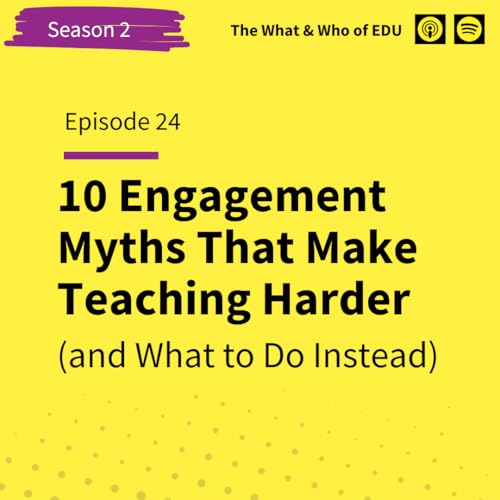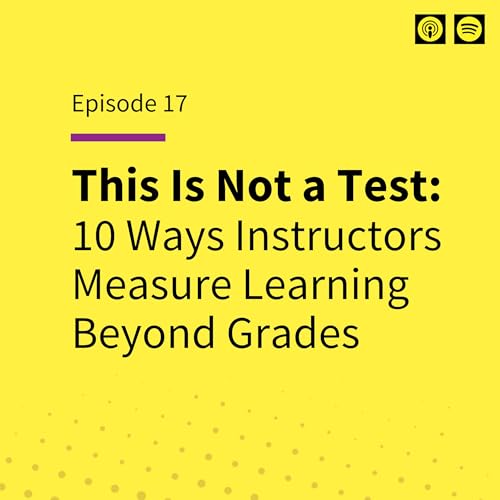Is an "A" really the best indicator of learning? Or is it just proof that a student figured out the system? In this episode of The What and Who of EDU, we explore 10 creative, surprising, and inspiring ways educators are measuring learning beyond the gradebook. Because the real story of learning is bigger, messier, and far more meaningful.
Brought to you by Macmillan Learning
🎓 Key Takeaways
- Judge the work, not the GPA
- Rethink the test
- Turn students into teachers
- Stack the game
- Measure the moment
- Track the trajectory
- Make it make sense
- Build the toolbox
- Listen for the learning
- Look for the long echo
📌 Featured Educators
Dr. Christin Monroe is an Assistant Professor of Chemistry at Landmark College, where she has been teaching for five years. She teaches Principles of Chemistry, Intro to Chemistry, Organic Chemistry, and Biochemistry, with a focus on supporting neurodivergent learners.
Dr. Daniel M. Look is the Charles A. Dana Professor of Mathematics at St. Lawrence University. He's spent over 25 years trying to convince students that math is useful and occasionally fun. He authored Math Cats: Scratching the Surface of Mathematics (Oct 2025), an illustrated exploration of mathematical ideas through the lens of cats.
Dr. Star Sinclair is an Assistant Professor of Psychology at Florida Gulf Coast University. For 18 years, she has taught general psychology, lifespan development, behavioral statistics, and research methods in psychology. She conducts research on metacognition, student success, and imposter phenomenon.
Mary Gourley is a psychology instructor at Gaston College with over 16 years of teaching experience. She also teaches gender, human sexuality, and social psychology courses at New Mexico State University's Global Campus.
Dr. Mike May is the lower division coordinator in the department of mathematics and statistics at Saint Louis University, where he has taught for 30+ years. During that time he has looked at how to effectively incorporate numerous technologies into effectively teaching math.
Jennifer Duncan is an Associate Professor of English at Georgia State University's Perimeter College. She has been teaching English literature and composition for twenty-five years and specializing in online teaching for fifteen.
Dr. Charlotte De Araujo is an Assistant Professor at York University with 16+ years of biology and biomedical science teaching experience. She has coordinated large-scale biology/biochemistry programs at multiple Ontario-based universities and was recognized with a 2023 Faculty of Science Excellence in Teaching Award.
Dr. Ryan Herzog is an Associate Professor of Economics, Program Coordinator, and Faculty Fellow at Gonzaga University, where he has been teaching for 16 years. His work focuses on macroeconomics, financial markets & public policy.
Betsy Langness is the Psychology Department Head at Jefferson Community and Technical College, where she has worked for more than 20 years. She teaches psychology courses in a virtual, asynchronous environment.
Dr. Amy Goodman is a Senior Lecturer in the Mathematics Department at Baylor University, where she has taught since 1999. In addition to teaching, she is also a course designer, author, teaching mentor, and learning analytics researcher. Her pedagogy is founded on the belief that all students can be successful at math.
Dr. Derek Harmon is an Associate Professor - Clinical in the Department of Biomedical Education and Anatomy at The Ohio State University College of Medicine. For over a decade, he has taught anatomy to students, medical residents and practicing clinicians. His research is focused on the impact of immersive technology on anatomy education.
Dr. Margaret Holloway is an Assistant Professor of English and the Composition Coordinator in the English & Modern Languages Department at Clark Atlanta University. My research is rooted in the rhetoric and composition discipline, and I have nine years of college-level teaching experience.
☎️ Join the Conversation
🔗 If this episode gave you something useful, or just made you nod while grading, pass it along to a colleague or that one friend who still says "I'm staying ahead this semester." (We believe in you.)
🔗 Got a tip of your own? Send us an email ar TheWhatAndWhoOfEDU@Macmillan.com or leave us a voicemail at (512) 765-4688 & your strategy might just make it into a future episode.
 28 分
28 分 25 分
25 分 25 分
25 分 26 分
26 分 33 分
33 分 36 分
36 分 43 分
43 分 29 分
29 分
